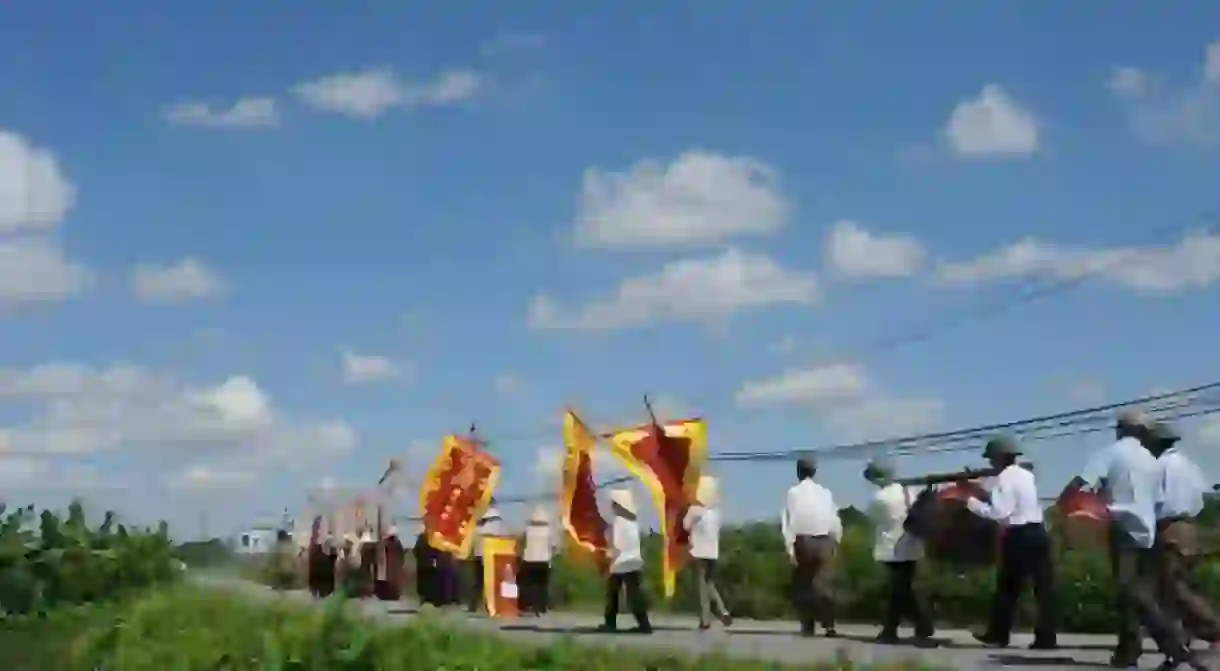The Fanfare of Vietnam's Funerals

You’ve been asleep for hours, dreaming of missed appointments and awesome super powers. But then, in the background, you hear music. It sounds like a marching band. Then you realise the music isn’t part of your dream — it’s coming from outside your window. At 5 am? What’s going on out there?
Vietnamese funerals
Vietnamese funerals have complex rituals, to say the least: gold coins and rice in the deceased person’s mouth, finger and toe nails clipped and packaged, and, weirdest of all, a vigilant guard for the coffin so that cats and dogs don’t jump over the body and bring the deceased back to life. We’re not kidding.
Some of the details vary between the major religions, but the basics are relatively the same. Ghosts are no laughing matter in Vietnam. The rituals are necessary for their loved ones to find peace in the next life — so they don’t linger around as angry ghosts, haunting those who displeased them.
After the family finishes the ‘Entering the Coffin‘ stage, relatives and friends and colleagues are invited to pay their respects at a ceremony that often lasts for days. There’s music, food and toasts to celebrate the deceased’s life and accomplishments — a final gesture to show them how much they were respected and cherished. Next time you get angry at people in white robes blocking an alley with large tents, remember that they are grieving.
On the morning of the last rite, which comes as early as 5am for Catholics, the family leads a procession to transport the coffin to a grave site. This is the part of the funeral most foreigners notice because they’re shocked to hear a marching band before sunrise. Vietnamese would never complain about the noise, though. When fortunes are reversed, those who are grieving will receive the same show of respect.
What’s with the style?
Some funeral rituals, such as the elaborate system for garments worn by the deceased, have changed to reflect modern realities. Full adherence to traditions would bankrupt many families. Even with the relaxed litany of rituals, families often go into substantial debt to give the deceased the best funeral possible — one last gesture of goodwill. Vietnamese believe that gestures afforded to the dead carry deep meaning, because it is one last chance to leave a good impression and remedy any misgivings you might’ve had.

The elderly of today grew up with the remnants of old colonial regimental bands — members of the Tirailleurs indochinois — who used trumpets, saxophones, trombones and snare drums. The musicians originally studied French songs, but, as Vietnamese independence grew from a wish to a reality, they learned to play Vietnamese folk music, as well as jazz, which the French tolerated on public radio. This also explains the white uniforms. Bands often dress in the French colonial style, reminiscent of the military uniforms worn by their musical ancestors — those who first learned to play these foreign instruments.

One last goodbye
The music for the final procession is often chosen based upon the circumstances of the death. If the person lived a full life, passing away at home, surrounded by family, the funeral should be a happier occasion. But if the person died young, or under unfortunate circumstances, the music should be sombre.
So when you hear jubilant music at 5 am in Vietnam, know that it’s a bittersweet moment for a family. The person is gone, but they’ve lived as full a life as any of us can reasonably expect. Many people try to avoid the topic of death — especially in the dark, predawn hours, when ghosts seem that much more real — but Vietnamese people understand that death is inseparable from living, so they celebrate a life well lived by way of song.














